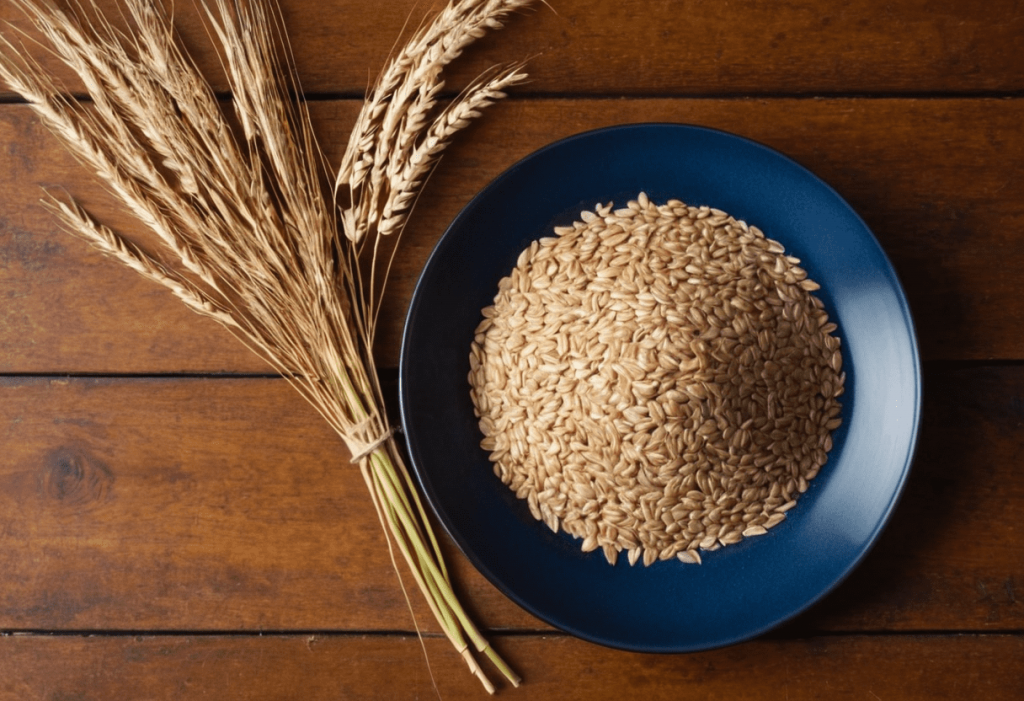Natural oatmeal is a nutrient-rich whole grain with a low glycemic index, making it an ideal food for people with diabetes. Its regular consumption can provide various health benefits, including:
Blood Sugar Control:
- Soluble Fiber: Oatmeal is an excellent source of soluble fiber, which slows the absorption of sugar into the bloodstream, helping to control glucose levels. A study showed that daily intake of 1 cup of oatmeal for 12 weeks reduced HbA1c levels by 0.5%.
- Low Glycemic Index: Oatmeal has a low glycemic index (GI) of 25, which means it doesn’t raise blood sugar levels rapidly. A low GI is important for people with diabetes, as it helps prevent glucose and insulin spikes.
Weight Management:
- Fiber and Protein: Oatmeal is a good source of fiber and protein, two nutrients that help you feel full and satisfied for longer, which can contribute to weight control. A study showed that people who consumed oatmeal as part of their diet lost more weight than those who didn’t.
- Low in Calories: Oatmeal is low in calories, making it an excellent choice for people looking to control their weight.
Cardiovascular Health:
- Soluble Fiber: Soluble fiber helps reduce LDL (“bad”) cholesterol and triglycerides in the blood, which can reduce the risk of heart disease.
- Antioxidants: Oatmeal contains antioxidants that help protect cells from damage caused by free radicals.
Examples:
- Person with Type 2 Diabetes: A 50-year-old adult with overweight and prediabetes starts consuming natural oatmeal for breakfast. After 3 months, they observe an improvement in their blood sugar levels and a reduction in body weight.
- Athlete with Type 1 Diabetes: A 20-year-old woman with type 1 diabetes who practices athletics consumes natural oatmeal as part of her diet to maintain her energy levels and control her blood sugar.
Fun Facts:
- Oatmeal is one of the oldest grains cultivated by humans.
- There are over 700 varieties of oatmeal in the world.
- Oatmeal is a significant source of protein, fiber, vitamins, and minerals.
- Oatmeal is an affordable and versatile food that can be included in various dishes.
Recommendations for Including Oatmeal in Your Diet:
- Consume at least 1 cup of oatmeal daily.
- Add oatmeal to soups, salads, stews, and other dishes.
- Try different types of oatmeal to find your favorite.
- Prepare oatmeal at home to control the amount of sugar and salt.
Relation to Other Blog Posts:
- Glycemic Index: This post explains in detail what the glycemic index is and how it affects blood sugar.
- Essential Foods for Diabetics: This post will help you learn about the best foods to control diabetes.
- Water Index in Food: This post will help you choose water-rich foods to stay hydrated.
- Symptoms of Type 2 Diabetes: This post will help you identify the symptoms of type 2 diabetes.
Conclusion:
Natural oatmeal is a healthy and nutritious food that can be beneficial for people with diabetes. Its regular consumption can help control blood sugar, weight, and improve cardiovascular health.

Type 2 Diabetes: Is It Really Reversible?
A recent National Geographic article [link] explores how type 2 diabetes could be reversible with the right approaches. This condition, which affects millions of people worldwide, has long been considered a chronic and progressive disease. However, recent research challenges this perception and suggests that with lifestyle changes and the right approach, remission is possible. The

How Do GLP-1 Drugs Compare? A Breakdown of Ozempic, Mounjaro, and Trulicity
GLP-1 receptor agonists have revolutionized diabetes management, with drugs like Ozempic, Mounjaro, and Trulicity leading the market. But how do these medications compare in terms of effectiveness, side effects, and patient outcomes? Let’s explore their differences and what they mean for diabetes patients. Understanding GLP-1 Medications GLP-1 receptor agonists mimic a natural hormone that helps

Why Has Medicare Spending on Diabetes Medications Skyrocketed in 5 Years?
In the past five years, Medicare spending on diabetes medications has increased nearly fivefold, reaching $35.8 billion in 2023. This surge has been primarily driven by the growing use of GLP-1 drugs such as Ozempic, Mounjaro, and Trulicity. But what is behind this cost escalation, and how does it affect patients and the U.S. healthcare

The Gut Microbiota and Blood Sugar Control: A Hidden Connection
The human gut is home to trillions of bacteria that play a crucial role in digestion, immune function, and even metabolism. Recent research has revealed a fascinating link between the gut microbiota and blood sugar regulation, shedding light on how the balance of microbes in our intestines can influence diabetes risk and overall metabolic health.

The Dawn Phenomenon: Why Blood Sugar Rises While You Sleep
For many people with diabetes, waking up with high blood sugar levels can be frustrating—especially if they didn’t eat anything overnight. This early-morning spike in blood glucose is known as the Dawn Phenomenon, and it happens due to natural hormonal changes in the body. But why does it occur, and how can it be managed?

The Influence of Red Light on Blood: Can It Improve Diabetes?
Type 2 diabetes is a metabolic disease characterized by insulin resistance and elevated blood glucose levels. In the search for complementary alternatives to improve glycemic control, red light therapy has gained attention due to its potential to enhance circulation, reduce inflammation, and optimize cellular function. But what does science say about it? ✨ What is

